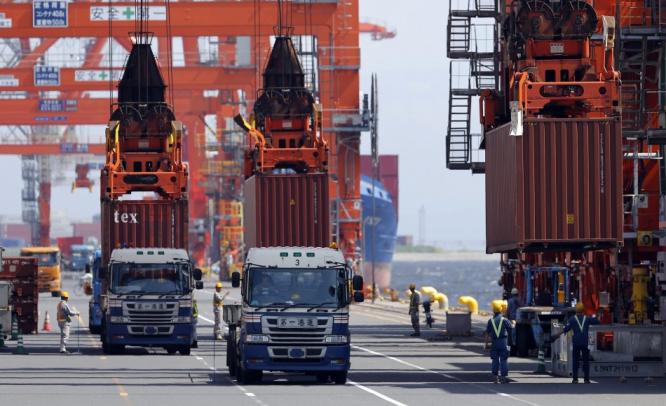April is not the cruellest month for economy as car exports to US rev up and a weak yen is expected to boost exports further, reports Team IFM
Tokyo, May 26: Japan improved its April trade balance with a 5.1 percent rise in exports and its imports clocking a 3.4 percent increase resulting in a 7.8 percent fall in deficit at 808.9 billion yen ($8 billion), according to preliminary figures released Wednesday by the Ministry of Finance.
The 808.9 billion yen deficit, according to the official data, compared with a gap of 877.4 billion yen a year earlier and with a 1.7 trillion yen deficit in March.
A Bloomberg News survey of 29 economists had predicted a moderate trade shortfall at 646.3 billion yen.
Decreases in trade deficits, going on for the last 22months, may put Japan on the path to recovery, shoring up its exports thus helping the economy wriggle out of deflation. But that is not going to happen any time soon. Moreover a weak yen vis-à-vis the dollar, resulting from Prime Minister Shinzo Abe’s heady concoction of fiscal and monetary policies, dubbed “Abenomics,” is yet to yield expected benefits for the export sector.
Exports have gone up as car sales revved up in the United States and there have been increased shipments of electronics exports to the rest of Asia.
“I expect a weak yen to boost exports from around the summer,” Reuters quoted Ayumi Maekawa, a senior economist at Mizuho Research Institute, as saying.
A weak yen makes exports cheaper and boosts the value of overseas revenues in yen terms. It, however, pushes up import prices. So far, the yen, ruling at a 4-1/2-year low against the dollar, has only managed to raise fuel import costs and eaten into gains from an increase in exports, with some economists seeing the economy belaboured by trade deficits for the rest of the year.
“We have to wait for exports to recover strongly before we will see a real drop in the trade deficit and that situation is still way out of sight,” Bloomberg quoted Chief Economist Yoshiki Shinke at Tokyo’s Dai-ichi Life Research Institute, as saying.
The import bill, too, has soared in recent years as the demand for fuel went up considerably in the wake of the devastating earthquake and tsunami in March 2011 that have led to idling of Japan’s nuclear plants.
Considering rising costs of imports and slow economic recovery around the world, experts say trade deficits are here to stay.
“A trade deficit is likely to persist at least this year given elevated costs of imports and a tepid recovery in the global economy due to uncertainty over China’s outlook and weakness in Europe,” Reuters quoted Ayumi Maekawa, a senior economist at Mizuho Research Institute, as saying.
SALES LEVY
Imports soared in March as businesses as well as consumers rushed to beat an expected increase in the sales tax. Prime Minister Abe hiked the tax from 5 to 8 percent on April 1 as he grapples with the world’s heaviest debt burden. Also, an environmental tax on power, effective the same day, undermined imports of fossil fuels, Bloomberg quoted Nomura Holdings Inc. economists led by Minoru Nogimori, as stating in a research report published before the data.
For this export-reliant country, a recovery in overseas economies would be more than welcome as its exports are seen to increase moderately riding that factor, Bank of Japan Chief Haruhiko Kuroda said Wednesday wrapping up a two-day meeting. He left the central bank’s monetary policy unchanged banking largely on his new-found hopes.
But economists expect the BOJ to take more action in the latter part of the year.
“The chances of additional stimulus being announced as soon as July have shrunk substantially, but we still think that more easing will eventually be required,” Associated Press quoted Marcel Thieliant, an economist for Singapore-based Capital Economics, as saying.
April is certainly not the cruellest month for Japan in terms of trade balance, but the deficit could widen again once sales pick up in coming months.
SURGE IN EXPORTS, IMPORTS
In April, Japan found the biggest export market in the US followed by China; but while its $5.4-billion trade surplus with the US was down 2.8 percent from the year-ago period, its $4.5-billion deficit with China showed a 3.5 percent rise.
Shipments to the US edged up 1.9 percent to 1,122.9 billion yen and imports rose 6.9 percent to 575.4 billion yen.
Exports to China, mainly consisting of machinery, chemicals and vehicles, gained 9.8 percent at 1,095.4 billion yen while imports, mostly of manufactured items, went up 7.8 percent to 1,556.4 billion yen.
Exports to the European Union increased 12.7 percent to 633.8 billion yen and imports 9.1 percent to 658.1 billion yen.
Imports of fossil fuels and gas went up following increased operations by thermal plants in a bid to recoup loss of generation as nuclear plants were shut down for safety checks after the March 2011 mishap at the Fukushima Dai-Ichi nuclear power plant, further eroding the trade balance.
High import bills have triggered trade deficits that Japan has been posting since 2011. The country, however, had been posting trade surpluses for the last 40 years beginning 1970.
In 2013, it had the highest trade deficit with China, Australia, Saudi Arabia, UAE, Western Europe and Russia. The country recorded biggest trade surpluses with US, Hong Kong, South Korea, Singapore and Thailand.
Now the official data shows that the economy grew a faster-than-expected 0.9 percent in January-March from the previous quarter, led by increased private consumption and exports, which helped recovery from a slump last year.
The data could be encouraging enough for Prime Minister Abe to stick to his aggressive policies as he seeks to garner strong support in the run-up to an Upper House election in July.

